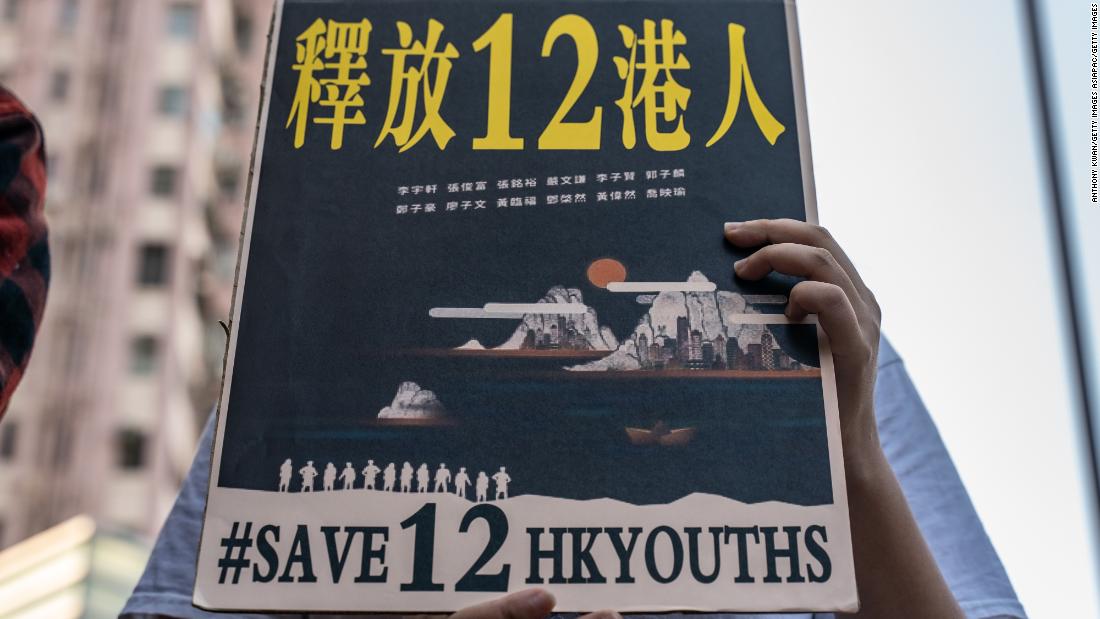Two convicted of organizing the illegal border crossing were sentenced to two and three years in prison, respectively. The other eight were convicted of participating in the border crossing and all received sentences of seven months. The Yantian People’s Court said all 10 pleaded guilty. All defendants also received fines ranging from $ 1,500 to $ 3,000.
Earlier on Wednesday, China handed over to Hong Kong police two suspects under the age of 18 who were also on the boat. Officials in the southern city of Shenzhen said they confessed to crossing the border illegally, but were not charged.
All 12 were detained for more than 100 days before this week’s trial in Shenzhen, while their parents and politicians in Hong Kong, the United States and the United Kingdom were pushing for their release. A group representing the defendants’ families said their loved ones were abused in Chinese custody and denied access to their lawyers.
The police and prosecutors in Shenzhen previously denied allegations of ill-treatment and claimed that the 12 had access to legal advice, although the practice in mainland China of denying defendants the lawyer of their choice by appointing a government-chosen lawyer documented in the past.
On Monday, a US State Department spokeswoman asked Beijing to release the 12 and allow them to leave the country, adding that their “so-called ‘crime’ was to flee tyranny.”
“The treatment given by the PRC authorities to these 12 individuals, some of whom are minors, has been terrible,” said the spokeswoman. “The Beijing authorities continue their campaign to eradicate the remaining rights and freedoms of the people of Hong Kong, falsely equating their system of government by party decree with the rule of law.”
The fate of the 12 activists has attracted considerable attention in Hong Kong and abroad, emblematic of the worsening political freedoms and climate in the city since the adoption of a new national security law earlier this year. The law – imposed on the city by Beijing, bypassing Hong Kong’s semi-democratic legislature – criminalized secession, subversion and collusion with foreign forces and has already had a major negative effect on politics and debate.
Chung reportedly tried to flee the city in October, seeking asylum at the United States Consulate, but was refused.
Escape routes have become increasingly tight this year, exacerbated by closures and blockages around the world as a result of the coronavirus pandemic. What had been a viable, though risky, sea route to Taiwan was closed as soon as the Chinese coast guard made it clear that it was monitoring the waters around the city.
Carrie Lam, the Beijing-appointed chief executive, refuted any suggestion that the Hong Kong government was aware of or was involved in the case before the 12 were arrested.
The fugitives “chose to flee and, during the flight, entered another jurisdiction and committed the crime of illegally entering elsewhere,” she said in October. “They have to face the legal consequences in that jurisdiction. It’s as simple and straightforward as that.”
The potential to face lawsuits in China was a major source of opposition to an extradition project that started protests last year, and the fate of the 12 appears to have corroborated many of the concerns in Hong Kong. Activists were reportedly denied access to adequate legal representation and little information was offered on their condition.
Chinese courts – along with prosecutors and the police – are overseen by the powerful Central Committee on Political and Legal Affairs of the Chinese Communist Party and its local branches.
In a statement, Amnesty International’s Asia Pacific regional director, Yamini Mishra, said the sentences “handed down after an unfair trial reveal the dangers faced by anyone who is tried by the Chinese criminal system”.
“Chinese officials have shown the world once again that political activists will not receive a fair trial,” she added.
